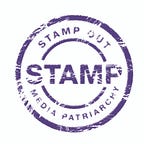Beyond International Women’s Day: Recent Discussion of Women in the Media
written by Lucy Wilson
Content warning: men’s violence against women; harassment; suicide
On this day last week (at the time of writing), I made a cutesy graphic to post on STAMP’s social media accounts in celebration of International Women’s Day. When I was making our posts, in response to the 2021 International Women’s Day theme of ‘Choose to Challenge’, I wrote: ‘STAMP will challenge media patriarchy.’ So, in the interests of following through on that intention, I’d like to discuss some of the things I’ve seen in the media over the last week.
This last week since International Women’s Day has, ironically, been quite a major media week for women — and not in a positive way. I could write a ridiculous number of blog posts challenging all kinds of things that have been said in the media in the last week, but I’m going to stick to a couple which I think are symptomatic of the wider issues.
Piers Morgan
I don’t think we can discuss anything that’s happened in the last week without first discussing Piers Morgan on Good Morning Britain. Better explanations of the wider context exist elsewhere, but for our purposes it’s enough to note that he spent International Women’s Day denigrating Meghan Markle on live TV and refusing to believe she considered ending her own life. Early last week may have been the pinnacle of the racist and misogynistic vitriol that Meghan Markle has received as she, her choices and her mental health were picked apart and judged by high profile commenters and internet trolls alike. Not only must this be an extremely difficult experience for Meghan herself (we know she has seen the Piers Morgan clip), but it could potentially have a much wider negative impact. As unlikely as Meghan is to see many of the random online comments, other people are sure to. If her mental health issues are being widely doubted then people who see these comments may think their mental health concerns will receive the same disbelief. This could result in people not seeking help, already often a very difficult task, for fear of not being taken seriously.
If you are experiencing mental health problems, there are people who will believe you and there are resources out there where you can find help.
Piers Morgan (Again)
The following day, on the same day as his departure from Good Morning Britain, Piers Morgan made comments about his colleague Charlotte Hawkins’ outfit, calling it a ‘mini-skirt’ and instructing her to stand up to show it, which she reluctantly did. It goes without saying that this is completely unacceptable in any workplace. I think his doing this on live TV indicates the extent to which he thought he could say anything he wanted on TV without consequence. For the avoidance of doubt, Charlotte Hawkins’ dress was perfectly acceptable workwear.
BBC News Headline
The final incident I am going to discuss came later in the week, in the midst of the public reaction to the murder of Sarah Everard. The last few days have seen a huge public outcry, mostly online, about the fact that women do not feel safe — and often are not safe — walking alone at night, amongst other things. People and organisations have been sharing some excellent articles, informative infographics and deeply personal stories from survivors. I’ve seen several men posting about how they have had their eyes opened to the scale of the problem and that they will take more action in future to contribute to lessening the problem. I truly hope this will be the case as the problem of men’s violence against women, and the environments that perpetuate that violence, cannot be solved without the active involvement of men. A lot of the conversation has centred on the role of men in women’s fear and violence against women and I’ve seen this extract shared often. So in the midst of all this, to see a BBC headline reading ‘Teenage girl headbutts man after being grabbed on path’ felt a bit clumsy, to say the least.
Who grabbed her on the path? Was it the man who was headbutted? Or was it someone else entirely and this man was simply caught in the aftermath of an event he had no part in? Removing the person who grabbed the girl from the action is doing what is so often done — making men’s violence against women a perpetrator-less crime, a random occurrence, an uncontrollable problem with an undefinable source. The headline has fortunately since been rephrased to ‘Teenage girl fights off man who grabbed her on path’ — a simple, but important change, immediately putting the responsibility on the perpetrator. Suddenly a man who only happened to be headbutted, potentially out of the blue, unprompted, becomes a man who grabbed a teenage girl who then defended herself. Although this headline is fairly insignificant in the larger conversation, I do think it is important to point things like this out, if only so that more people will notice it in future, become aware of its impact and eventually we should see less of it. As online news media is such an important part of how we receive information, the framing of that information is worthy of discussion.
I really hope the current conversations are finally the beginning of real change and it is encouraging that so many people are expressing their outrage at the way things are. I remain cautiously optimistic that the conversation is beginning to change for the better, and I commit to continuing to do my small part to challenge media patriarchy.
